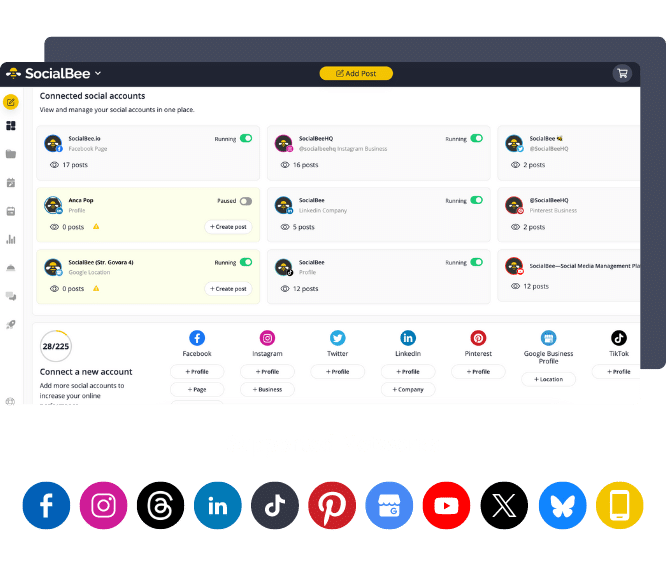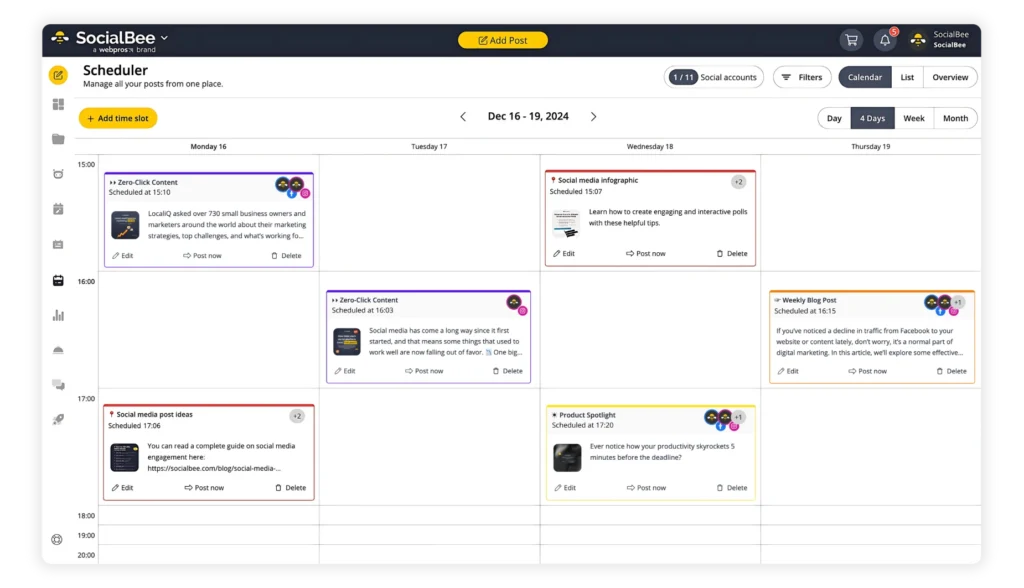
Content Writer at SocialBee
Mastodon and Bluesky are making waves as decentralized social media platforms, but how do they stack up against each other?
This article breaks down what sets them apart, from Mastodon’s server-specific rules to Bluesky’s custom domain feature. We’ll cover how they work, their standout features, and what makes each one unique.
If you’ve been curious about these platforms, keep reading to get the full picture. Let’s dive in!
Streamline your marketing with an efficient social media strategy template.
Short summary
- Mastodon uses independent servers (instances) with their own rules and communities. Bluesky has a single, unified platform that’s simpler to join and use.
- Bluesky lets you link your profile to a custom domain (like @yourname.com) for verification. Mastodon ties your username to the server you join (e.g., @username@instance.com).
- Mastodon allows server admins to set rules for their own instance and even block entire servers. Bluesky has one set of rules for everyone and no server-level moderation.
- Mastodon has polls, favorites, boosts (like retweets), and lets you save posts. Bluesky keeps it simple with likes, reposts, and replies but doesn’t support polls or post-saving.
- Both platforms are ad-free and don’t offer ways for creators to earn money. Mastodon is funded through donations, while Bluesky relies on external funding.
- Neither platform supports native content scheduling. However, you can use third-party tools like SocialBee to plan posts for both Mastodon and Bluesky.
Table of contents
- What is Mastodon?
- What is Bluesky?
- Mastodon vs Bluesky: How do the social media platforms differ?
- 1. Both platforms have strict character limits
- 2. Mastodon lets you share polls, but Bluesky doesn’t
- 3. Both platforms support hashtags and tagging
- 4. Mastodon lets you customize your profile more
- 5. Both platforms provide chronological and custom feeds
- 6. Neither platform lets you schedule content directly
- 7. Mastodon also lets users block entire servers
- 8. Only Mastodon includes content warnings for posts
- 9. Mastodon includes a “favorite” and “boost” option
- 10. Neither platform offers direct monetization or paid subscriptions
- 11. Bluesky offers custom domains as a form of verification
- 12. Mastodon lets you automatically delete older posts
- 13. Both platforms support two-factor authentication
- 14. Neither platform provides built-in analytics
- 15. Both platforms are decentralized but differ in structure
- 16. Mastodon prioritizes moderation with customizable server rules
- 17. Both platforms support direct messaging
- Frequently asked questions
- Ready to choose the best decentralized microblogging platform?
What is Mastodon?
Mastodon is a social media platform created by Eugen Rochko, a German developer, in 2016. Users can post, follow others, and interact, with a user experience similar to X (formerly Twitter). However, instead of being one big website, it is made up of many smaller communities called instances.
Each instance is run by its own team and follows its own rules, but they all connect, allowing users to interact across them. You can always find one that fits your interests, whether that’s art, activism, or just chatting. It’s all about people connecting without ads or algorithms getting in the way.
The biggest advantage of the platform is account portability. Your Mastodon account is on a specific server in the ActivityPub protocol.

At first, Mastodon mostly attracted tech-savvy users who cared about privacy and open-source software. The platform started getting more attention and a higher engagement when most people were looking for alternatives to bigger social media sites. This usually happened after things like policy changes, privacy issues, or frustration with how bigger platforms were being run.
By 2024, it had around 10 million active users around various instances. Mastodon is a non-profit, ad-free platform that runs on donations or subscriptions.
What is Bluesky?
Bluesky is a decentralized social network designed to give users more control over their data and interactions online. Built on the AT Protocol, Bluesky supports features like self-hosting, allowing users to store and manage their data on their own servers. This flexibility ensures users can move their posts, followers, and identity to another platform if needed.
Created in 2019 by Jack Dorsey as a Twitter-funded project, Bluesky became an independent company in 2022, functioning on an invite-only system at first, with an open-sourced client code. While it currently offers a unified experience, the platform is moving toward a full federation network, where users can create their own servers with custom rules, offering more personalization and control.
As of 2024, Bluesky has grown to over 24 million active users. The company is now led by Jay Graber, who oversees its development and direction.
Mastodon vs Bluesky: How do the social media platforms differ?
TL;DR: Mastodon and Bluesky are both representatives of the open and decentralized standard, but they approach things differently. Mastodon is built around separate servers with their own rules. It offers features like polls, content warnings, server blocking, and options to automatically delete old posts. Mastodon also has “favorites” and “boosts” for posts, making it great for community-driven users.
Bluesky, on the other hand, works as a single platform. It focuses on simplicity, offering features like custom domains for verification and curated feeds based on interests. Both have chronological feeds and direct messaging, but Mastodon gives you more control, while Bluesky is easier to use.
These are the core differences between Mastodon and Bluesky:
- Both platforms have strict character limits
- Mastodon lets you share polls, but Bluesky doesn’t
- Both platforms support hashtags and tagging
- Mastodon lets you customize your profile more
- Both platforms provide chronological feeds
- Neither platform lets you schedule content directly
- Mastodon also lets users block entire servers
- Only Mastodon includes content warnings for posts
- Mastodon includes a “favorite” and “boost” option
- Neither platform offers direct monetization or paid subscriptions.
- Bluesky offers custom domains as a form of verification
- Mastodon lets you automatically delete older posts
- Both platforms support two-factor authentication
- Neither platform provides built-in analytics
- Both platforms are decentralized but differ in structure
- Mastodon prioritizes moderation with customizable server rules
- Both platforms support direct messaging
1. Both platforms have strict character limits
Bluesky has a 300-character limit per post. In comparison, Mastodon gives you 500 characters by default. However, since Mastodon is made up of different servers run by various admins, some of them might allow more or fewer characters depending on their settings.
2. Mastodon lets you share polls, but Bluesky doesn’t
Mastodon and Bluesky both let you share text, images, and videos, but they handle content sharing in different ways. On Mastodon, you can upload your own GIFs, which gives you more options, while Bluesky relies on Tenor, so you’re limited to what’s available there.
Mastodon also has a poll feature, making it simple to ask questions and get feedback from followers, but Bluesky doesn’t have this yet, which makes it a bit less interactive.

When it comes to threads, Bluesky makes it easy to organize longer conversations. Mastodon supports threads too, but the experience depends on the server you’re using.
3. Both platforms support hashtags and tagging
Both Mastodon and Bluesky let you use hashtags and tag other users in posts. To tag someone on Mastodon, type “@” followed by their full username, like @user@instance.com. On Bluesky, just type @username to tag them.
To add a hashtag, type “#” followed by a word or phrase without spaces, like #Example. Once you post it, the hashtag becomes clickable so others can find related posts.
When it comes to locations, neither platform currently offers built-in location tagging. However, users can mention locations in their text or hashtags (e.g., #NewYork), and Mastodon’s community instances sometimes focus on specific regions or cities, creating a localized feel that Bluesky doesn’t replicate.
4. Mastodon lets you customize your profile more
Bluesky makes it easy to set up and customize your profile with features like starter packs and lists. Starter packs are groups of accounts or feeds tailored to your interests.
You can create your own or ask Bluesky to generate one for you, making it simpler to find and follow accounts that match your preferences right away. Lists help you organize the accounts you follow by topics, like work or personal interests, so it’s easier to focus on what matters to you.

Bluesky also lets you add a profile picture, cover photo, and a bio of up to 300 characters. You can even use your own website as your username, showing that your account is official without needing platform approval.
Mastodon, on the other hand, ties your profile to the instance you join, which can limit some options. While you can still add a profile picture, cover photo, and bio, the level of customization depends on the specific instance’s rules. Mastodon also has lists, but they only allow you to organize accounts you already follow.
Unlike Bluesky’s starter packs, there’s no feature to help you find or follow accounts quickly. This means building your network on Mastodon requires more manual effort, making it highly customizable but less streamlined compared to Bluesky.
5. Both platforms provide chronological and custom feeds
On Bluesky, the Home page offers different algorithmic feeds like “Following,” “Discover,” and “For You.” The “Following” feed shows posts only from accounts you follow, keeping things simple. In contrast, the “Discover” feed recommends posts based on who you follow and the content you engage with.
Bluesky also has a #Feeds section where you can explore customized feeds on topics like “Art,” “Science,” or “News,” giving you more control over what appears in your timeline.
Mastodon, on the other hand, organizes content through its Home, Explore, and Live Feeds sections. The Home feed shows posts from accounts you follow, while Explore highlights popular posts, hashtags, people, and news across different other instances. The Live Feeds section allows you to see posts from servers in real-time, offering a broader view of the Mastodon network.
Both platforms keep things straightforward without relying heavily on algorithms, but they give you different ways to shape your feed based on your preferences.
6. Neither platform lets you schedule content directly
Neither Bluesky nor Mastodon lets you schedule posts directly on the platform. If you want to schedule content, you’ll need to use third-party services.
PRO TIP
SocialBee offers a direct integration for Bluesky, allowing you to create and schedule, and share posts directly on the platform. It’s a straightforward way to manage your Bluesky content without needing to log in every time you want to post.
SocialBee’s Universal Posting feature allows you to schedule content for platforms like Mastodon, where direct posting isn’t supported. Instead of posting automatically, it sends reminders when it’s time to share your content. You can create and schedule posts in advance on SocialBee. When it’s time to post on Mastodon, you’ll receive a mobile notification, and with a few taps through SocialBee’s mobile app, you can easily share your scheduled content.
Plan your Mastodon and Bluesky content ahead!
7. Mastodon also lets users block entire servers
On both Mastodon and Bluesky, you can block or mute individual users. Blocking stops them from seeing your posts or interacting with you, while muting hides their posts from your feed without them knowing.

Mastodon also lets you block entire servers. If a server is hosting harmful content or has rules you don’t agree with, you can block everyone on it at once.
8. Only Mastodon includes content warnings for posts
Only Mastodon lets you add content warnings to your posts. This feature allows you to hide sensitive or spoiler-heavy content behind a label, so others can choose whether to view it.
 Bluesky doesn’t have this option, so all posts are visible as they are shared.
Bluesky doesn’t have this option, so all posts are visible as they are shared.
9. Mastodon includes a “favorite” and “boost” option
Mastodon offers several ways to interact with posts. You can “favorite” a post, similar to liking it, or “boost” it, which is the equivalent of a retweet—it shares the post with your followers without adding your own comment. You can also reply to posts to join the conversation directly.

Mastodon lets you bookmark posts to save them for later. This is a private action, so only you can see the posts you’ve saved—similar to Instagram’s bookmark feature. Mastodon also allows reposts (called “boosts”), where you share a post with your followers without adding any comments, and it lets you “quote” posts to share them with your own commentary.
Bluesky, on the other hand, doesn’t have a bookmark option. It keeps things simpler with features like likes (similar to favorites), reposts (similar to boosts), and replies. However, it does let users quote posts, adding personal context to a repost.
10. Neither platform offers direct monetization or paid subscriptions
Neither Mastodon nor Bluesky shows ads or lets creators earn money directly through the platform.
Instead, they use other monetization strategies to stay funded. Mastodon instances rely on donations or subscriptions, often through platforms like Patreon.
Bluesky is taking a different approach. In July 2023, it introduced a paid service where users could buy custom domains to use as their handles, offering a unique way to personalize profiles. Then, in November 2024, Bluesky announced a $15 million Series A funding round and plans for a subscription service. This would include premium features like higher-quality video uploads or more options for customizing profiles.
11. Bluesky offers custom domains as a form of verification
Bluesky lets you use custom domains for verification, so your profile can be linked to your website. This shows others that your account is official and tied to a domain you own, making it a clear way to prove your identity.
Mastodon doesn’t have custom domains. Instead, your username is tied to the instance you join, like @username@instance.com. While this shows which server you’re part of, it’s not a form of verification, and it doesn’t give the same level of trust as a custom domain on Bluesky.
12. Mastodon lets you automatically delete older posts
Mastodon allows you to delete posts automatically after a certain time. You can choose a time limit, like a few weeks or months, after which your posts are removed. This feature is helpful if you want to keep your account clean or reduce your online footprint.

To set up automatic deletion of older posts on Mastodon, follow these steps:
- Access your account through your server’s website or the Mastodon web app.
- Go to Preferences > Automated post deletion. (On mobile web service, click the ⚙️ icon, then ☰, and select Automated post deletion.)
- Choose how long posts should stay before they’re deleted, anywhere from 1 week to 2 years.
- If there are specific posts you want to keep, define them here.
- Tick the box marked Automatically delete old posts.
- Click the Save changes button to finalize your settings.
Such a feature is not available for Bluesky users, so posts stay up unless you delete them manually.
13. Both platforms support two-factor authentication
Bluesky and Mastodon both let you set up two-factor authentication through your social media profile settings. It works the same way on both platforms, adding an extra step to log in and keeping your account secure. This feature shows they care about having a good privacy policy.
14. Neither platform provides built-in analytics
Neither Mastodon nor Bluesky has built-in analytics. You won’t find tools to track things like likes, reposts, or follower growth. If you want to track how your posts are doing, you’ll need to use third-party tools or keep track manually.
15. Both platforms are decentralized but differ in structure
Mastodon is built on a network of independent servers (instances), each with its own rules and community. When you sign up, your account is tied to a specific server, but you can still interact with users on other servers. Public posts and moderation depend on the server’s policies, giving admins a lot of control.
Bluesky works differently. It uses a unified structure where all accounts are part of the same network, making it easier to join and interact without picking a server. Recently, Bluesky added the option for users to run their own servers. These servers connect to the main platform, allowing users to manage moderation and push public posts while still being part of the wider Bluesky network. This gives users more control while keeping things simple.
16. Mastodon prioritizes moderation with customizable server rules
Bluesky and Mastodon handle moderation differently. On Mastodon, moderation is tied to individual servers (instances), where admins set rules and can block entire servers (defederation). This works well for smaller communities but can vary widely depending on the instance.
Bluesky offers a centralized default automated moderation system managed by its team, but it also allows users to customize their experience with stackable moderation services. These are add-ons, like filters to block specific content (e.g., “Spider Shield”), that users can subscribe to on top of Bluesky’s default moderation.
Bluesky’s open-source tool, Ozone, lets developers create their own moderation systems, making it easier for communities to set their own rules. For now, the data export option is in its beta phase.
17. Both platforms support direct messaging
Both Mastodon and Bluesky allow users to send direct messages, but there are some differences.
On Mastodon, DMs depend on the server you’re using. You can only message people you follow, and the rules can vary depending on the server. The messages are private but not end-to-end encrypted, so server admins might still be able to see them. This setup works well for smaller communities but can feel limiting in larger networks.
Bluesky makes messaging simpler. You can send DMs to any user on the platform without worrying about server restrictions. Like Mastodon, though, the messages aren’t end-to-end encrypted, so privacy isn’t fully guaranteed.
Mastodon’s DMs are more community-focused, while Bluesky keeps things straightforward and open.
Frequently asked questions
No, Bluesky is not part of Mastodon. They are two separate platforms with different approaches to decentralization. Mastodon uses independent servers (called instances), each with its own rules and communities. Bluesky, while also decentralized, offers a unified experience and has started rolling out self-hosting options, allowing users to manage their data while keeping things simpler than Mastodon’s server-based structure.
The best Twitter alternative depends on what you’re looking for.
Mastodon works well if you want smaller, tight-knit communities focused on specific interests, much as Twitter did before Elon Musk took over the company. It does require picking a server, which can feel a bit more hands-on, but it provides a lot of flexibility and control.
Bluesky, on the other hand, feels closer to early Twitter with its simple, unified setup. It’s great if you want a straightforward experience without worrying about servers, while still offering some level of decentralization through features like self-hosting.
If you are a Twitter user who values community-driven spaces, Mastodon might be your pick. But if ease of use and a familiar experience are more important, Bluesky is a solid choice.
It depends on what you’re looking for. Mastodon is good if you want to join smaller, focused communities on different servers, each with its own rules. It’s great for finding specific groups that match your interests.
Bluesky, on the other hand, has a single network and a simpler setup. The Bluesky community is more general, making it easier to connect with a wider range of people without worrying about picking the right server.
Since both platforms are gaining popularity, we recommend trying both to see which works best for your specific industry or interests. After some time, you’ll have a better sense of which one aligns more with your needs and can decide which to stick with as a primary platform.
Ready to choose the best decentralized microblogging platform?
Mastodon and Bluesky offer different takes on decentralized social media. Mastodon focuses on smaller, independent communities with unique rules, while Bluesky keeps things simple with one unified platform. Both are solid alternatives to traditional social media, depending on what you’re looking for.
To make managing your content easier, try SocialBee. With its integration for Bluesky and universal posting feature for Mastodon, you can plan and schedule posts across both platforms in one place. It’s a simple way to save time and stay consistent. Start your 14-day free SocialBee trial today!













